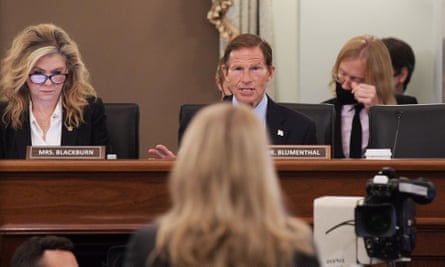Facebook puts “astronomical profits before people”, harms children and is destabilising democracies, a whistleblower has claimed in testimony to the US Congress.
Frances Haugen said Facebook knew it steered young users towards damaging content and that its Instagram app was “like cigarettes” for under-18s. In a wide-ranging testimony, the former Facebook employee said the company did not have enough staff to keep the platform safe and was “literally fanning” ethnic violence in developing countries.
She also told US senators:
The “buck stops” with the founder and chief executive, Mark Zuckerberg.
Facebook knows its systems lead teenagers to anorexia-related content.
The company had to “break the glass” and turn back on safety settings after the 6 January Washington riot.
Facebook intentionally targets teenagers and children under 13.
Monday’s outage that brought down Facebook, Instagram and WhatsApp meant that for more than five hours Facebook could not “destabilise democracies”.
Haugen appeared in Washington on Tuesday after coming forward as the source of a series of revelations in the Wall Street Journal last month based on internal Facebook documents. They revealed the company knew Instagram was damaging teenagers’ mental health and that changes to Facebook’s News Feed feature – a central plank of users’ interaction with the service – had made the platform more polarising and divisive.
She told senators on Tuesday that Facebook knew Instagram users were being led to anorexia-related content. She said an algorithm “led children from very innocuous topics like healthy recipes … all the way to anorexia-promoting content over a very short period of time”.
In her opening testimony, Haugen, 37, said: “I’m here today because I believe Facebook’s products harm children, stoke division and weaken our democracy. The company’s leadership knows how to make Facebook and Instagram safer, but won’t make the necessary changes because they have put their astronomical profits before people.” She added that Facebook was “buying its profits with our safety”. In 2020, Facebook reported a net income – a US measure of profit – of more than $29bn (£21bn).
Referring to Monday’s near six-hour outage in which Facebook’s platforms including Instagram and WhatsApp were disabled for billions of users, Haugen’s testimony added: “For more than five hours Facebook wasn’t used to deepen divides, destabilise democracies and make young girls and women feel bad about their bodies.” Facebook has 3.5 billion monthly active users across its platforms including Instagram and WhatsApp.
Warning that Facebook makes choices that “go against the common good”, Haugen said the company should be treated like the tobacco industry, which was subject to government action once it was discovered it was hiding the harms its products caused, or like car companies that were forced to adopt seatbelts or opioid firms that have been sued by government agencies.

Urging lawmakers to force more transparency on Facebook, she said there should be more scrutiny of its algorithms, which shape the content delivered to users. “The core of the issue is that no one can understand Facebook’s destructive choices better than Facebook, because only Facebook gets to look under the hood,” she said. With greater transparency, she added, “we can build sensible rules and standards to address consumer harms, illegal content, data protection, anticompetitive practices, algorithmic systems and more”.
The hearing focused on the impact of Facebook’s platforms on children, with Haugen likening the appeal of Instagram to tobacco. “It’s just like cigarettes … teenagers don’t have good self-regulation.” Haugen added women would be walking around with brittle bones in 60 years’ time because of the anorexia-related content they found on Facebook platforms.
Haugen told lawmakers that Facebook intentionally targets teens and “definitely” targets children as young as eight for the Messenger Kids app.
Haugen said that, according to internal documents, Zuckerberg had been given “soft options” to make the Facebook platform less “twitchy” and viral in countries prone to violence but declined to take them because it might affect “meaningful social interactions”, or MSI.
She added: “We have a few choice documents that contain notes from briefings with Mark Zuckerberg where he chose metrics defined by Facebook like ‘meaningful social interactions’ over changes that would have significantly decreased misinformation, hate speech and other inciting content.”
Haugen said Zuckerberg had built a company that was “very metrics driven”, because the more time people spent on Facebook platforms the more appealing the business was to advertisers. Asked about Zuckerberg’s ultimate responsibility for decisions made at Facebook, she said: “The buck stops with him.”
Haugen also warned that Facebook was “literally fanning ethnic violence” in places such as Ethiopia because it was not policing its service adequately outside the US.
Referring to the aftermath of the 6 January storming of the Capitol, as protesters sought to overturn the US presidential election result, Haugen said she was disturbed that Facebook had to “break the glass” and reinstate safety settings that it had put in place for the November poll. Haugen, who worked for the Facebook team that monitored election interference globally, said those precautions had been dropped after Joe Biden’s victory in order to spur growth on the platform.

Among the reforms recommended by Haugen were ensuring that Facebook shares internal information and research with “appropriate” oversight bodies such as Congress and removing the influence of algorithms on Facebook’s News Feed by allowing it to be ranked chronologically.
“Frances Haugen’s testimony appears to mark a rare moment of bipartisan consensus that the status quo is no longer acceptable,” said Imran Ahmed, chief executive officer of the Center for Countering Digital Hate, a non-profit that fights hate speech and misinformation. “This is increasingly becoming a non-political issue and one that has cut through definitively to the mainstream.”
Haugen’s testimony is likely to add pressure on US lawmakers to attempt legislative measures against the tech company. Senator Ed Markey suggested during the hearing that Congress would take action. “Here’s my message for Mark Zuckerberg: your time of invading our privacy, promoting toxic content in preying on children and teens is over,” Markey said. “Congress will be taking action. We will not allow your company to harm our children and our families and our democracy, any longer.”
“Today’s testimony from Frances Haugen is a catalyst for change,” said Senator Amy Klobuchar. “The time for action is now.”
Haugen’s lawyers have filed at least eight complaints with the US financial watchdog accusing the social media company of serially misleading investors about its approach to safety and the size of its audience.
Facebook has pushed back forcefully against Haugen’s accusations. In a blogpost published on Tuesday evening, Mark Zuckerberg said it was “difficult to see coverage that misrepresents our work and our motives”.
“At the heart of these accusations is this idea that we prioritize profit over safety and wellbeing. That’s just not true,” the Facebook CEO wrote, going on to cite the company’s work to overhaul its News Feed to focus on “meaningful social interactions”, and saying that internal research about the effects of Instagram on young people had been “mischaracterized”.
Though her testimony was built on thousands of internal documents gathered from the company, a company spokesperson, Andy Stone, said in a tweet during the hearing: “Just pointing out the fact that Frances Haugen did not work on child safety or Instagram or research these issues and has no direct knowledge of the topic from her work at Facebook.”
Responding after the hearing, Lena Pietsch, Facebook’s director of policy communications, said: “Today, a Senate commerce subcommittee held a hearing with a former product manager at Facebook who worked for the company for less than two years, had no direct reports, never attended a decision-point meeting with C-level executives and testified more than six times to not working on the subject matter in question. We don’t agree with her characterization of the many issues she testified about.
“Despite all this, we agree on one thing; it’s time to begin to create standard rules for the internet. It’s been 25 years since the rules for the internet have been updated, and instead of expecting the industry to make societal decisions that belong to legislators, it is time for Congress to act.”
Earlier, Facebook had issued a series of statements downplaying Haugen’s document leaks, saying: its Instagram research showed that many teenagers found the app helpful; it was investing heavily in security at the expense of its bottom line; polarisation had been growing in the US for decades before Facebook appeared; and the company had “made fighting misinformation and providing authoritative information a priority”.
Responding to accusations that Facebook had misled the public and regulators, the company said: “We stand by our public statements and are ready to answer any questions regulators may have about our work.”